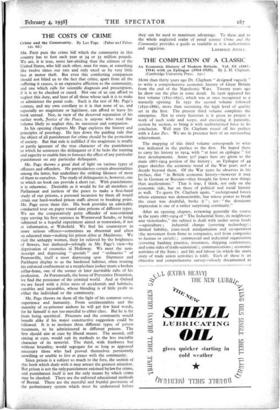THE COSTS OF CRIME
MR. PAGE puts the crime bill which the community in this country has to foot each year at 34 or 35 million pounds. We are, it is true, more law-abiding than the citizens of the United States, who kill each other, man for man, at something like twelve times our rate and only excel us by very little less at motor theft. But even this comforting comparison should not blind us to the fact that crime, apart from all the suffering it causes, is an expensive affliction to the community, and one which calls for scientific diagnosis and prescription, if it is to be checked or cured. Not one of us can afford to neglect this duty, and least of all those whose task it is to make or administer the penal code. Such is the test of Mr. Page's sermon, and my own corollary to it is that none of us, and especially no magistrate or legislator, can afford to leave his book unread. Nor, in view of the deserved reputation of his earlier work, Justice of the Peace, is anyone who read that volume likely to neglect this, its successor and companion.
In his opening chapters Mr. Page explores the history and principles of penology. He lays down the guiding rule that the object of all punishment for crime should be the protection of society. But that rule is nullified if the magistrate is totally or partly ignorant of the true character of the punishment to which he sentences the delinquent or if he lacks the training and sagacity to enable him to forecast the effect of any particular punishment on any particular delinquent.
Mr. Page throws a great- deal of light on various types of offences and offenders. He particularises certain abnormalities among the latter, but underlines the striking likeness of most of them to ourselves. The study of delinquents is, however, one to which no book can provide a short cut. With punishments it is otherwise. Desirable as it would be for all members of Parliament and justices of the peace to make a first-hand study of our prisons, a personal incursion by them all would strain our hard-worked prison staffs almost to breaking point. Mr. Page saves them this. His book provides an admirably conducted tour on paper round nine prisons of different types. We see the comparatively petty offender of non-criminal type serving his first sentence in Wormwood Scrubs, or being subjected to a hopeful experiment aimed at restoration, if not at reformation, at Wakefield. We find his counterpart in more serious offence—sometimes an abnormal and often an educated man—making his prison debut at Maidstone. We visit the unhappy women, their lot relieved by the brightness of flowers, but .darkened—wrofigIy in Mr. Page's view—by deprivation of cosmetics in Holloway. We meet the non- descript and depressing "specials " and " ordinaries " of Pentonville, itself a most depressing spot. Dartmoor and Parkhurst display to us the hardened habitué, often treating his enforced confinement as a steeplechase jockey treats a broken collar-bone, one of the sooner or later inevitable rubs of his profession. At Portsmouth, the home of Preventive Detention, we find the pensioner of the criminal world. And at Oxford we are faced with a fritto misto of accidentals and habitués, curables and incurables, whose blending is of little profit to either the individual or the community.
Mr. Page throws on them all the light of his common sense, experience and . humanity. From sentimentalists and the majority of ex-prisoner authors he will get few kind words, for he himself is not too merciful to either class. But he is far, from being uncritical. Prisoners and the community would benefit alike if his major constructive suggestion could be followed. It is to institute three different types of prison treatment, to be administered in different prisons. The first should aim at cure by liberal means. The second, still aiming at cure, would suit its methods to the less tractable character of its material. The third, with frankness but without brutality, would segregate for as long as appeared necessary those who had proved themselves persistently unwilling or unable to live at peace with the community:
Since prison is a subject so much to the fore, the section of this book which deals with it may attract the greatest attention. But prison is not the only punishment enjoined bylaw for crime, and punishment" itself is not the only means by which crime may be checked. There are the enforced educational methods of Borstal. There are the merciful and fruitful provisions of the probationary system which must be understood before
they can be used to maximum advantage. To these and to the whole neglected realm of penal science Crime and the -Community provides a guide as readable as it is authoritative














































 Previous page
Previous page